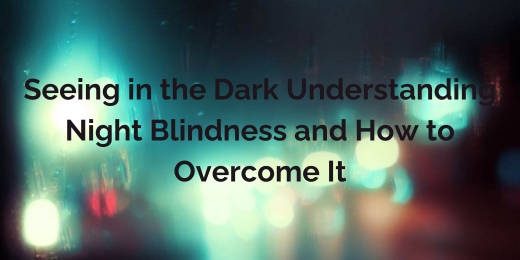Night blindness treatment
Night blindness, often referred to as nyctalopia, is a visual impairment that impairs a person’s ability to see in low-light settings, such as at night or in locations with little illumination. As a result, people may find it challenging to navigate their surroundings. This important health concern affects millions of individuals worldwide.
If you have night blindness, it can be difficult to travel in the dark, which can have a big negative influence on your everyday life. Nonetheless, night blindness treatment, lifestyle changes and pharmacological interventions are viable options for managing and eventually curing this illness. In this post, we’ll discuss the risk factors for night blindness and the therapies and preventative measures presently available.
Causes of night blindness
Night blindness is commonly caused by congenital retinal abnormalities or vitamin A deficiency. Also, both can impair night vision. Vitamin A is vital for keeping healthy eyes and good vision. Several eye disorders, including night blindness, have been linked to a lack of this vital mineral. Additionally, exploring facts about minerals highlights their essential roles in maintaining overall bodily functions, emphasizing their abundance in various foods and their diverse functions.
Inherited retinal disorders are hereditary defects that affect the retinal cells, decreasing vision and culminating in night blindness. Retinal defects that run in families can be passed on from parent to child. Numerous other conditions, such as cataracts and glaucoma, as well as several drugs, including those used to treat epilepsy, have been linked to cases of night blindness.
Preventing night blindness
Maintaining a nutritious diet high in vitamin A is one of the greatest methods to prevent night blindness. Vitamin A-rich foods include dark green leafy vegetables, liver, sweet potatoes, and carrots. When you are in a region with a great deal of bright light, it is necessary to wear sunglasses to safeguard your eyes from the sun.
Furthermore, you should stop smoking because it raises your chances of acquiring eye diseases such as cataracts and others. It’s also critical to have frequent eye exams to catch any potential vision problems before they worsen. Additionally, recognizing the importance of the immune system underscores its crucial role in safeguarding our overall health from infections.
Overcoming night blindness
If you suffer from night blindness, various treatment options are available to help you recover. Vitamin A supplementation is commonly regarded as one of the most effective therapies for night blindness. While treating the underlying disorders that cause night blindness, prescription drugs are likely required in some circumstances.
Using contact lenses or glasses with a yellow or amber tint can help improve a person’s vision in dimly lit environments. When travelling in the dark, you can also use low-vision aids such as magnifying glasses.
Lifestyle adjustments can also help with the treatment of night blindness. For example, ensuring that your home has adequate lighting is critical, particularly in the areas where you spend the most time at night. Similarly, unless essential, you should never drive at night and always walk more cautiously when there is little light available. Likewise, if you have an inherited retinal illness that causes night blindness, speaking with a genetic counsellor about your planning options may be advantageous. Additionally, recognizing that what you eat is what you are underscores the profound impact of dietary choices on your physical health and well-being.
Night blindness treatment
If you have night blindness, you must seek medical help immediately from an eye care specialist. There will be different techniques for treating night blindness depending on the underlying cause. In some cases, taking vitamin A supplements or using other medications that require a doctor’s prescription may be necessary.
Surgery may be required in more severe cases to correct underlying problems such as glaucoma or ocular cataracts. This may be your only option. The use of low-vision aids such as magnifying glasses may also be beneficial in the treatment of night blindness.
Conclusion
Although night blindness is a disease that can profoundly impact a person’s daily life, it can be managed and treated in several ways. You can lower your risk of acquiring night blindness or effectively manage its symptoms if you consume a balanced diet, wear sunglasses outside, and seek medical assistance from a skilled eye care specialist.
These procedures will safeguard your eyes against sun damage. Receive the proper treatment and modify your lifestyle. You will be able to see more clearly in low light and negotiate hard situations with confidence.



